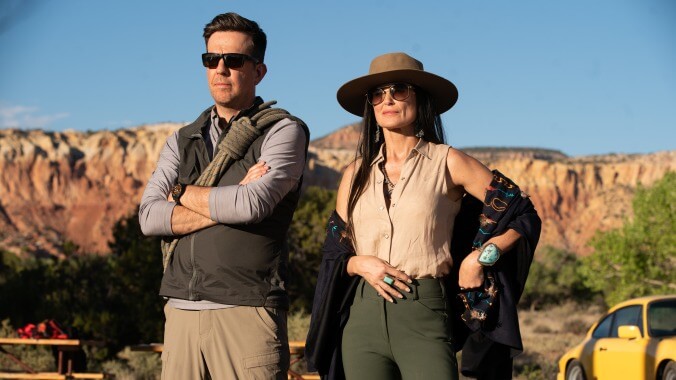The problem with so many movies that try to portray the drudgery and frustrations of office life is the pervasive feeling (however inaccurate it may be) that the filmmakers may not have ever experienced that drudgery firsthand. This can be true even of filmmakers who have ears and eyes for the mundane. Sam Bain, screenwriter of Corporate Animals, co-created the British TV series Peep Show, which often scores big laughs from ridiculous yet quotidian details of its protagonists’ lives. Director Patrick Brice has experience mining social situations for both horror (Creep) and cringe humor (The Overnight). Yet Corporate Animals, a dark comedy with horrific undertones that should draw upon many of their previous experiences, never feels especially relatable.
Brice and Bain may have overcomplicated matters by trying to satirize several different strains of workplace misery at once. At its core, Corporate Animals is about a tedious company team-building retreat gone wrong. Lucy (Demi Moore), the company’s CEO, insists on the value of a dangerous spelunking expedition, which backfires when a cave-in traps a bunch of testy office workers together underground. But these aren’t just regular office clock-punchers. The movie opens with an extended ad for Lucy’s company, called Incredible Edible; it’s a start-up creating environmentally friendly edible cutlery, and as soon as the well-observed piece of corporate self-congratulation ends, Lucy interjects to call it bullshit and berate her assistant Jess (Jessica Williams) for not doing better. Within minutes, Corporate Animals announces its intention to spoof general office politics, feckless start-up culture, and tone-deaf, condescending corporate feminism. (Lucy urges Jess to locate her “inner Beyoncé.”)
These are all worthy targets, but not as instantly compatible with each other as the movie seems to think. Are the characters worn-out white-collar drones, or haphazardly assembled start-up strivers being sold a bill of goods? It may seem like a minor distinction, but it would help clarify the movie’s sense of reality. Instead, the story presses forward with a half-hearted accidental rivalry between Jess and fellow assistant Freddie (Karan Soni), who both feel that they’ve been promised a major promotion by Lucy. They also begin to suspect that their company may not be as solvent as they’ve been led to believe, at a particularly inopportune time—just as they’ve headed down into a cave with a bunch of their co-workers (including several familiar and welcome faces like Isiah Whitlock Jr., Nasim Pedrad, Calum Worthy, Dan Bakkedahl, Jennifer Kim, and Martha Kelly). It’s telling that the movie seems to think that casting Ed Helms as the group’s guide is a good way to establish the story’s office-satire bona fides. Easier to pinch a cast member from The Office, apparently, than to imitate that show’s (sometimes) grounded sensibility.
Once the cave-in happens, the elements are in place for the movie to become a tiresome sitcom with low lighting and minimal stage dressing—or a gross-out would-be cult movie when it broaches the topic of cannibalism. (Someone is killed during the initial cave-in, the others are trapped and starving, and, well…). But Brice and Bain find more of groove underground, and most surprising, the cannibalism material is some of the movie’s best. Instead of smug self-amusement at dealing with such a taboo topic, Corporate Animals assumes a grim practicality as the characters talk over the horrifying logistics. Cannibalism becomes a way for the film to finally access a sense of absurd pettiness, micromanagement, and uncomfortable group dynamics that’s largely missing from its earlier workplace comedy. Its talented comics actors finally have something substantial and clever to dig into.
Specifically, this dark turn benefits smaller players like Pedrad and Worthy, who make momentarily strong impressions from sketchy characters. Williams and Soni have the gift and the curse of likability, which limits their deadpan reactions, but it’s poor Demi Moore who bears the brunt of the movie’s worst impulses. She gives it her all as the ruthless and self-interested Lucy, but the movie’s ideas for her are about as expansive as her vocabulary of—get ready to laugh—swear words! As amusingly loopy as Corporate Animals can get when it’s backed into a corner, its broader satirical ideas tend to be self-defeating. Even at a brisk 86 minutes, this feels like an awfully long meeting—and if the filmmakers really recognize that sensation, their movie doesn’t show it.



 Keep scrolling for more great stories from A.V. Club.
Keep scrolling for more great stories from A.V. Club.